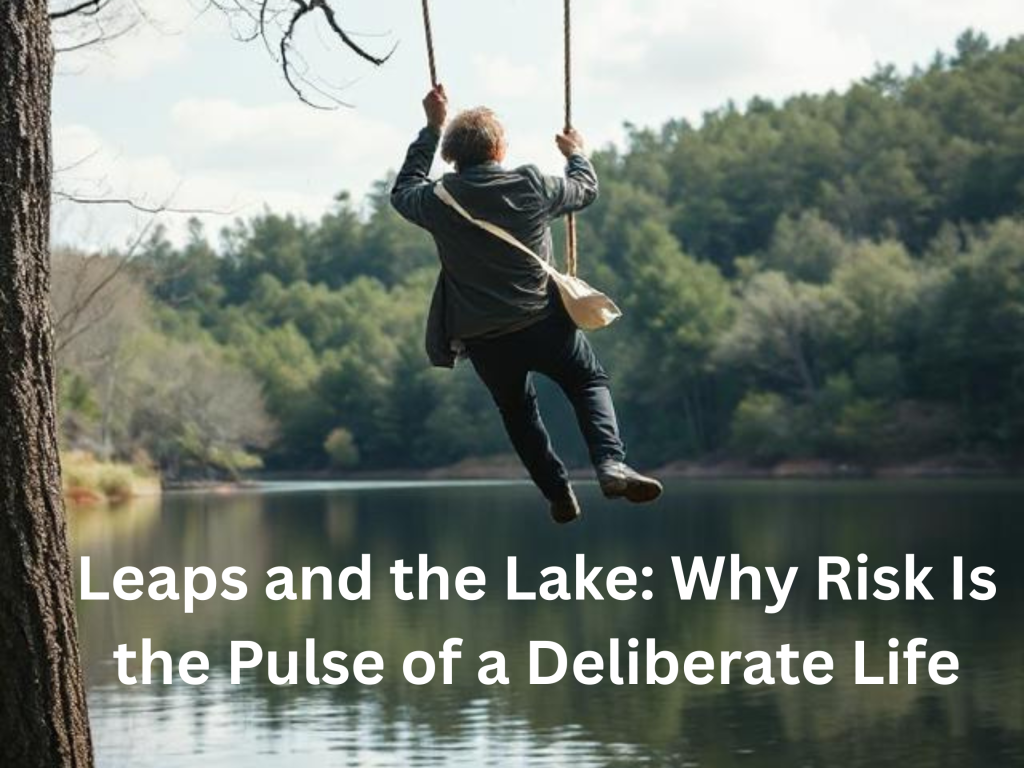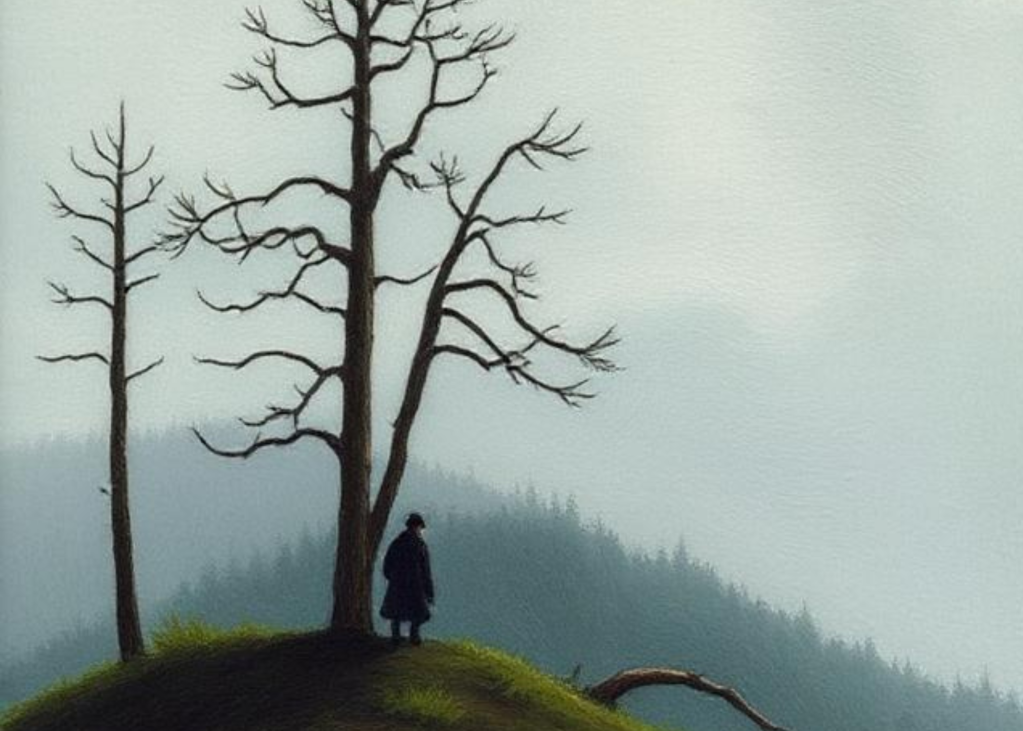Leaps and the Lake: Why Risk Is the Pulse of a Deliberate Life
- gonplcs39
- May 5
- 5 min read

“I went to the woods because I wished to live deliberately…” But what Thoreau doesn’t say outright—what we must read between the pine needles to see—is that to live deliberately is also to risk deliberately.
Risk is the heartbeat of change, the quiet courage that urges us to leave the safe harbor of the known and paddle toward deeper waters. Not recklessly, but intentionally—aware of the winds, accepting the waves, curious about what lies beyond the bend.
Unopened Paths: What Awaits Beyond the Known
The Power of Risks
Too often, we associate risk with recklessness, with danger or disaster. But risk, at its core, is simply the decision to step outside your comfort zone and toward possibility. It’s a willingness to trade certainty for potential, and in doing so, we create the conditions for transformation.
Thoreau’s retreat to Walden Pond was not a passive escape—it was an intentional risk. He risked isolation, misunderstanding, and failure in order to find clarity, truth, and freedom. It was the ultimate leap of the spirit. And it is one that still calls to us today.
Fields Yet to Be Wandered (New Opportunities)
Taking risks is often the only path to new landscapes—whether literal or metaphorical.
That new job you almost didn’t apply for. The person you nearly didn’t meet. The idea you shelved because it felt too bold. These are all doors we often leave closed because we fear what’s behind them. But risk is the key. It unlocks experiences, careers, and relationships that routine never could.
Thoreau could have stayed in Concord and written from the safety of a parlor. Instead, he chose a cabin in the woods and gave us Walden.
Cultivating the Inner Landscape (Personal Growth)
Every risk we take stretches us.
It forces us to confront fear, build resilience, and grow into someone stronger than we were before. Even when we stumble—perhaps especially when we stumble—we discover what we’re made of. And each time, we expand our sense of self.
Risk doesn’t just bring growth. It brings authenticity. It peels away who we think we should be and leaves us closer to who we truly are.
Bending with the Wind (Learning and Adaptability)
To risk is to invite both success and failure—and in that, there is deep wisdom.
Failure isn’t the opposite of growth; it’s part of the process. Every misstep becomes a teacher. Every unexpected outcome sharpens our understanding and our instincts.
The pond may be calm one day and stormy the next, but the person who has dared to wade in learns how to navigate change with grace. Risk teaches us to adapt, to course-correct, and to try again with greater clarity.
The Bloom of Creative Boldness (Increased Creativity)
There is no creativity without risk.
Innovation requires us to think differently, to imagine what hasn’t yet been done, and to act in ways that feel uncertain. Risk-taking quiets the inner critic and gives space to the muse. It breaks patterns and invites play.
Thoreau’s writing was a creative risk—a challenge to the norms of his time. But in daring to say what others wouldn’t, he gave us a blueprint for original, courageous living.

Rooted Through the Storm: How Risk Cultivates Endurance
Why We Should Take Risks
To live deliberately, as Thoreau reminds us, is not merely to reflect—but to act. Risk is the instrument through which intention becomes reality. It is the paddle that stirs the still waters of a life otherwise untouched by boldness.
“Not until we are lost do we begin to understand ourselves.” — Henry David Thoreau
Facing the Shadows Within (Overcoming Fear)
Fear often masquerades as reason. It tells us to wait, to shrink, to stay. But Thoreau walked into the woods precisely because he knew that fear would always be a companion of the unexamined life. To live meaningfully, we must face fear not as a wall, but as a threshold. Each risk we take becomes a step toward liberation from the imagined limits we place on ourselves.
“I learned this, at least, by my experiment: that if one advances confidently in the direction of his dreams… he will meet with a success unexpected in common hours.”
Fortitude from the Forest (Building Resilience)
There is no true resilience without risk. When Thoreau chose solitude at Walden, he risked loneliness, irrelevance, even failure. And yet it was in solitude that he built the inner scaffolding that would hold his life and legacy. In our own lives, risk teaches us how to recover, how to reframe setbacks as stepping stones.
“What lies behind us and what lies ahead of us are tiny matters compared to what lives within us.”

Expanding Horizons
Risk stretches the edges of the map. It takes us beyond what is known or expected into new realms of creativity, purpose, and self-discovery. Like Thoreau tracing the seasons at Walden, we come to see the richness of the world—and of ourselves—when we abandon the path most worn and make our own.
“It is not worth the while to go round the world to count the cats in Zanzibar.” Sometimes the real adventure lies in the risk just outside your door.
Increased Confidence
Confidence, for Thoreau, was never bluster. It was the quiet, steady certainty that comes from aligning one’s life with one’s principles—and daring to live them out loud. Risk builds that confidence. With each brave act, we become more attuned to our own strength, more fluent in the language of our inner voice.
“Go confidently in the direction of your dreams. Live the life you have imagined.”
A Note on the Challenges of Risk-Taking
Risk is not without consequence. Every leap carries the possibility of loss—financial, emotional, or physical. The uncertainty can be unsettling, and the emotional weight of failure or rejection is real. Some risks, if not approached mindfully, may even carry legal or ethical implications. But this is where discernment matters. Thoreau was not advocating for recklessness, but for intentional courage—the kind that asks, What is truly worth risking for? Living deliberately means weighing not just the comfort of safety, but the cost of regret. And in many cases, the risk of staying stuck is far greater than the risk of moving forward.
Final Thoughts: Answering the Call
If you hear the faint call of the unfamiliar—if something within you stirs when you think of starting over, speaking out, stepping forward—listen to it. That is the pulse of a deliberate life.
Not all leaps are grand. Some are small shifts. Some are whispered yeses. But all of them matter.
The lake waits. The path unfolds. And the life you long for is often on the other side of risk.
